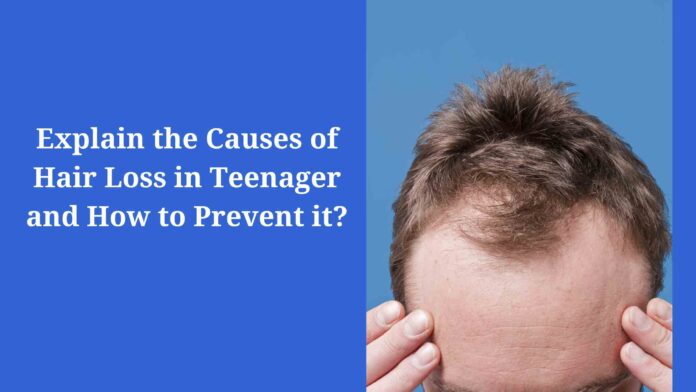There are many reasons why people experience hair loss, but one of the most common causes of hair loss in teenager is alopecia, which refers to the loss of scalp hair over some time. Alopecia can affect men and women, including teenagers, but it’s more common in men than women. The relevant news is that there are easy changes you can make to help prevent this condition in yourself or someone you know who might be at risk. Here’s everything you need to know about what causes hair loss in teenager and how to prevent it.
What is Hair Loss
Teenagers can experience some different issues related to hair loss. Find out about some common reasons for teenager hair loss, and learn about some easy ways you can combat your child’s problem. If you have children experiencing balding, understanding their condition can help remove some of your worries. And if you are a teenager yourself experiencing any symptoms, knowing what could be causing them will help you start on a course toward restoration. Whatever your circumstances, here is a list of possible reasons for teenage hair loss and some solutions that may work for you.
Why do teens lose their hair?
According to science, male-pattern baldness is a genetic condition that runs in families. But teen girls losing their hair may have Polycystic Ovary Syndrome (PCOS), which occurs when a woman’s ovaries create high levels of male hormones. Some experts believe PCOS is triggered by insulin resistance when your body can’t correctly use sugar for energy. This is most common among people with obesity or type 2 diabetes. If you think you might be suffering from PCOS, see your doctor right away. Medication and lifestyle modifications can help keep your hair from falling out.
Even if your hair doesn’t grow back, there’s still hope: Several celebrities like Victoria Beckham and Natalie Portman sport sleek hairstyles even though they’re not as complete as they once were. We don’t recommend following in their footsteps, but remember that beauty comes in all shapes and sizes!
The link between Hormones and Hair Loss
Hair problems can be a sensitive topic for both men and women alike. Hair is one of those items on our body that we take for granted. This is primarily correct when we are young, but even as adults, most people don’t appreciate their hair until something goes wrong with it.
For men, losing their hair can make them self-conscious about their appearance, which often leads to them covering up balding areas by styling their remaining hair differently or choosing more conservative hairstyles altogether. Women too have a lot riding on their looks, especially once they hit their 40s; if they’re no longer able to grow long locks, they may start going through serious midlife crisis-like symptoms such as extreme depression and anxiety.
Signs of Teenagers’ Hair Loss
During puberty, male and female teens may experience a variety of changes. For example, many develop excess body hair. But for some teens, excessive shedding or thinning may cause concern. Teenagers who notice a receding hairline, bald patches, or patches of unusually thinning hair should talk with their doctor about what’s going on—they may have alopecia areata or another type of condition that can be treated with medication or other therapies.
How can you avoid losing your hair?
Hair loss is a pretty common problem, especially in teens. Many factors can contribute to your hair loss. For example, diet plays an essential role in preventing hair loss because some foods don’t work with our bodies. People lose their hair because they don’t eat enough protein! When you get enough protein in your body, you can avoid losing your hair.
These treatments can help improve hair health and slow down any issues leading to baldness. For example, a special shampoo can add nutrients back to your scalp, encouraging hair growth. Specific vitamins like vitamin A or biotin can promote healthy follicles, giving you thicker strands.
Medications such as minoxidil lotion also stimulate blood flow, so more oxygen reaches your scalp. Other laser light therapy options use heat-activated light beams to activate collagen production, so hair follicles don’t break as easily. These are all a few ways you can avoid losing your locks!
These are several easy steps to stop your teenagers hair loss and help keep you looking youthful for longer.
Conclusion
Hair loss has many causes, including too much stress, hormonal changes (telogen effluvium), medical conditions, etc. However, there are ways to stop or slow down hair loss in teenager—like changing their diet or making sure they are getting enough Vitamin D. Start doing these things today if you have any concerns about losing your hair.

















